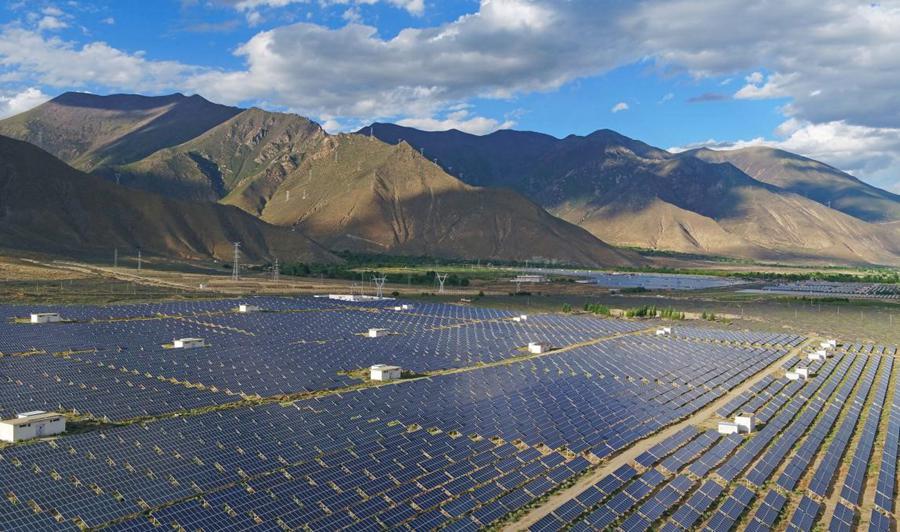China's human rights development acknowledged at six online side-events to 46th session of UN Human Rights Council (4)
 |
| Photo taken on June 13, 2020, shows a photovoltaic power station built for poverty alleviation, which has been connected to the national grid, in Shannan, southwest China's Tibet autonomous region. (People's Daily Online/Song Weixing) |
China's endeavors and achievements in promoting and protecting human rights attracted great attention and were generally acknowledged during six seminars held on the sidelines of the 46th regular session of the United Nations Human Rights Council (UNHRC) recently via video link.
Officials with relevant social organizations and human rights experts and scholars from dozens of countries, including China, Germany, the Netherlands, Russia, Nepal, and South Africa, conducted extensive and in-depth discussions and exchanges during the webinars, which were organized by China Society for Human Rights Studies (CSHRS), Chinese Association for International Understanding (CAFIU) and other human rights research institutions at home and abroad.
During a seminar on employment and labor rights in northwest China's Xinjiang Uygur autonomous region, experts agreed that Xinjiang's various policies and practices concerning employment and job security comply with China's Constitution and relevant laws, accord with international labor and human rights standards, and have effectively guaranteed the rights to life and development of all ethnic groups.
Nilufer Gheyret, a Ph.D. candidate at the Communication University of China, has conducted a survey among 70 employees of Xinjiang's ethnic minority groups working in five enterprises in south China's Guangdong province.
The results of her survey, which were shared at the seminar on employment and labor rights in Xinjiang, showed that these workers from Xinjiang chose to work in enterprises voluntarily, and that all their labor rights have been fully guaranteed.
Working outside of Xinjiang has also helped them increase their family incomes, broaden their horizons, improve their language skills and vocational and technical skills, according to the respondents.
At a webinar on poverty alleviation and culture preservation in southwest China's Tibet autonomous region, experts pointed out that by adhering to the country's targeted poverty alleviation strategy, Tibet has secured historic results in poverty reduction and greatly guaranteed the rights to life and development for people of all ethnic groups under the support of the Communist Party of China (CPC) and the Chinese government.
Participants at the symposium discussed the successful practices and cases in Tibet's poverty alleviation and cultural protection efforts, which Zheng Dui, director-general of the China Tibetology Research Center, believes can help the international community see through the slanderous remarks made by some people against Tibet.
Dr. Sarbottam Shrestha, president of the Arniko Society in Nepal, noted at the symposium that the Chinese government is committed to protecting traditional Tibetan culture and respects the Tibetan people's love for traditional culture.
Experts participated in a webinar on exchanges and mutual learning between civilizations and promotion of human rights protection reached a consensus that jointly tackling the COVID-19 pandemic and other challenges faced by mankind requires people of all countries to deepen mutual understanding and maintain mutual trust and unity.
China's remarkable achievements in economic and social development have not only greatly improved the quality of Chinese people's lives, but also provided huge opportunities for other countries, said Garth Shelton, director of the East Asia Project at the Wits University in South Africa, who considers striving for such achievements exactly a way of respecting to and protecting human rights.
Yilixinna, a woman of the Uygur ethnic group with the CAFIU, shared stories about how the generations of her grandmother, mother and herself of the Uygur ethnic group enjoyed education and found jobs at a seminar on the development and human rights protection of ethnic minority groups in China.
"My mother and two of her three sisters all received higher education, and my cousin and I have completed postgraduate studies," she said, adding that many women of ethnic minority groups in Xinjiang have been well educated like them.
Xinjiang has done a lot of work in guaranteeing the rights and interests of women and children, she pointed out, who thinks that the fact that the rights and interests of women and children in Xinjiang are fully protected serves as an epitome of the human rights development in China.
"I really hope that people with ulterior motives could stop making irresponsible remarks against Xinjiang," she said.
China's poverty reduction experience was warmly welcomed by scholars from many developing countries during a seminar on the South-South cooperation in poverty alleviation and human rights protection.
China's policy of targeted poverty alleviation is a good example of the country's people-centered development, said Tom Zwart, director of the Cross-cultural Human Rights Centre at the Vrije Universiteit Amsterdam.
China's achievements in promoting human rights by lifting people out of poverty should be recognized and its experience in this regard is worthy of learning by other countries, Zwart added.
 |
Photos
Related Stories
- China urges U.S. to drop double standards on human rights
- China’s report reveals hypocrisy, double standards of human rights situation in US: experts
- Shared value of Western countries is to protect their privileged position: China Daily editorial
- Report details human rights violations in US
- Infographics: Without health, there can be no human rights
- Commentary: Surging anti-Asian hate crimes and America's inherent human rights sins
- Western countries should stop imposing double standards regarding human rights
- China votes against EU-drafted resolution on Belarus at UNHRC
- Why Washington is a human rights double-dealer
- Commentary: Western countries should stop imposing double standards regarding human rights
Copyright © 2021 People's Daily Online. All Rights Reserved.










